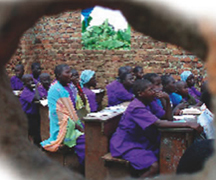
The University of Notre Dame’s Ford Family Program in Human Development Studies and Solidarity will celebrate its formal launch Sept. 25 (Thursday) with a lecture by renowned Oxford University economist Paul Collier, author of the award-winning book “The Bottom Billion.”
The lecture, which is free and open to the public, will take place at 4p.m. in the Hesburgh Center auditorium at Notre Dame with a reception to follow.
At the inaugural celebration, Collier will speak on “The Bottom Billion: Can We Make a Difference?” Director of the development research group at the World Bank from 1998 to 2003, Collier is a professor of economics at Oxford and the director of the Centre for the Study of African Economies. His research has focused on governance in low-income countries, economic growth in Africa and the economics of civil war.
Collier’s most recent book is “The Bottom Billion: Why the Poorest Countries are Failing and What Can Be Done About It,” in which he argues that a group of about 50 countries are falling further and further behind the rest of the world. He urges the Group of Eight industrialized nations to adopt policies to help these poorest states join the rest of the world in its declining poverty.
With a $6 million gift from the family of Notre Dame Trustee W. Douglas Ford earlier this year, the Kellogg Institute for International Studies created the Ford Program to address the critical challenges faced by those living in extreme poverty, particularly in sub-Saharan Africa. The program seeks to build a transnational and interdisciplinary alliance of scholars, public servants, conscientious citizens and institutional partners.
The Ford Program advances knowledge by supporting research, teaching and learning opportunities for Notre Dame students and faculty and by collaborating with partner universities. It works with local communities in Africa to apply program-sponsored research results to the design and implementation of innovative solutions that expand opportunities for those trapped in poverty.
This model of human development is guided by the principles of Catholic social teaching, which encourages solidarity with those in deepest need, learning from them and working together with them as they become the agents of their own change.
While not confined to Africa, the Ford Program is beginning there and building upon partnerships that Notre Dame has already forged. Partners include Uganda Martyrs University (the nation’s Catholic University), the Millennium Villages project, and the people of two Ugandan villages – Nnindye, on the shores of Lake Victoria, and Ruhiira, near the Tanzanian border. In Nnindye and Ruhiira, disease, poverty, illiteracy, environmental degradation and a lack of infrastructure are major challenges.
*Contacts: * Elizabeth Rankin, 574-631-9184, erankin3@nd.edu ;Tony Pohlen, Ford Program, 574-631-7022 or apohlen@nd.edu
Originally published by at newsinfo.nd.edu on September 19, 2008.